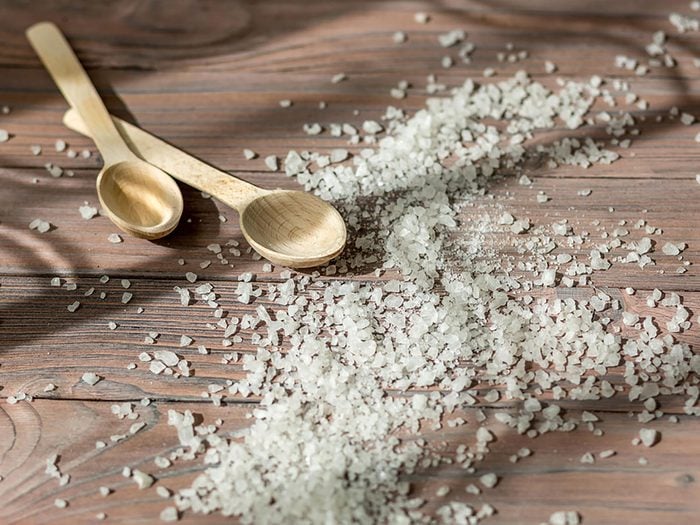
An Epsom salt bath can ease your aches and pains
One of the most popular uses of an Epsom salt bath is to help soothe away muscle aches after a hard workout or a long day of work. Some believe that the chemical composition of the salt—magnesium sulfate—can be absorbed by the skin to help block receptors from feeling the pain. While it is true that taking magnesium blocks pain receptors, it’s not as clear if sitting in a bath is as effective, says Amy Baxter, MD, founder and CEO of MMJ Labs, and clinical associate professor with the Medical College of Georgia. So it may be the magnesium helping or it may just be the warm, relaxing bath. Either way, we’ll take it.

It can help soothe arthritis
Epsom salts can be used as a compress to help soothe aching joints. People with rheumatoid arthritis who soaked their joints in warm bath salts felt significantly better while a control group that used plain saltwater saw no change, according to a study published in Clinical and Experimental Rheumatology. To try this at home, heat two cups of Epsom salts in a gallon of water, then either bathing the affected joint in it or applying a warm compress to the area. Try a few of these other arthritis home remedies.

An Epsom salt bath can soothe eczema
The National Eczema Association recommends a number of different types of baths—including one with Epsom salt—to help take the sting out of the bath and soothe the dry, itchy patches. Find out if your itchy skin is caused by eczema—or something else.
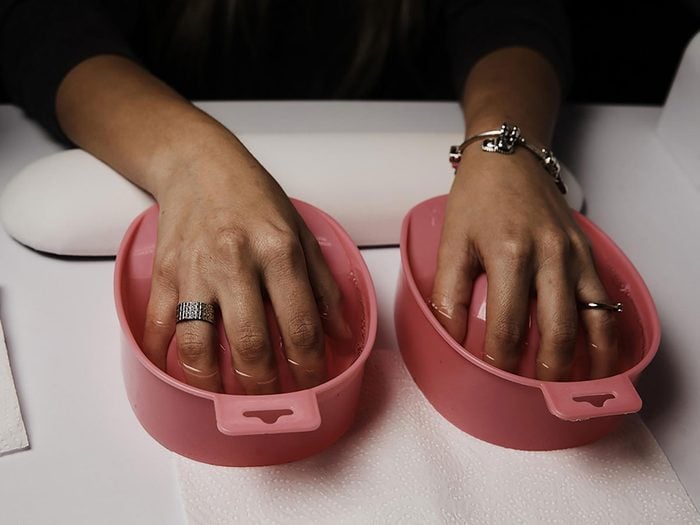
Epsom salts can make splinters—and bee stings—easier to remove
Got a splinter? Soaking the area in an Epsom salt bath for 15 minutes can help make it easier to remove, according to the Epsom Salt Council. Epsom salt increases osmotic pressure on the skin, which draws foreign bodies toward the surface, they explain.
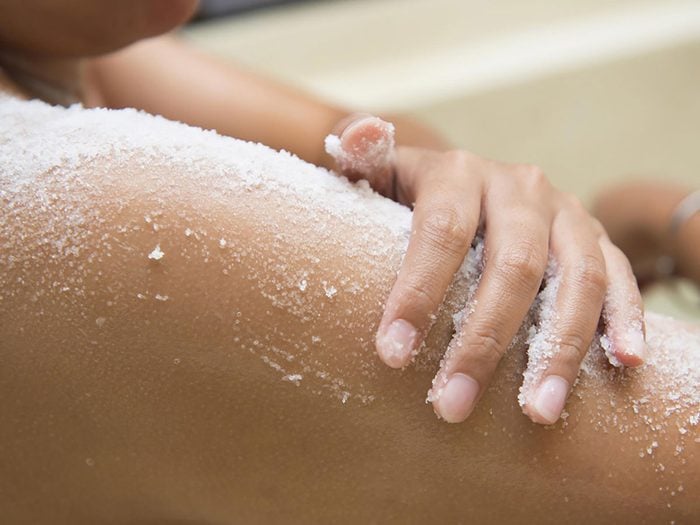
Try Epsom salts as an exfoliant
Just like other granular salts, Epsom salts can make a pretty great exfoliant, helping to slough off dry skin, according to the Epsom Salt Council. Mix a couple of tablespoons with 1/4 cup coconut oil and use it to scrub away dead skin on everywhere from your lips to your toes.

Sunburn pain can be minimized
Soaking in an Epsom salt bath with lukewarm water can help ease the sting of a sunburn. Soaking in a cool bath with two cups of Epsom salt can lessen the pain of the burn and the anti-inflammatory properties will help reduce swelling, according to the Epsom Salt Council.
Need more ideas for sunburn relief? Try these unexpected at-home sunburn soothers.
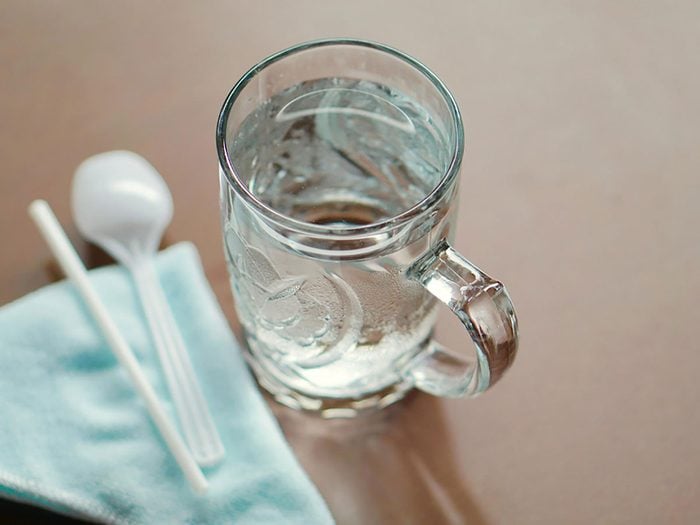
Epsom salts can work as a laxative
All backed up in the bathroom? Drinking Epsom salts has a “potent laxative effect,” according to a study published in Therapeutic Advances in Gastroenterology. Dissolve two to six teaspoons of the salts into eight ounces of warm water and a squeeze of lemon to improve the taste.
Still feeling stuck? Try one of these other home remedies for constipation.
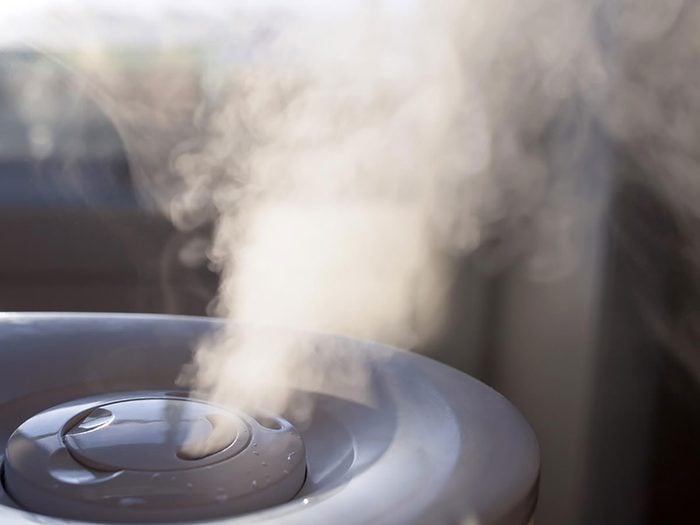
Try Epsom salts to open your sinuses
Taz Bhatia, MD, an integrative medicine doctor, swears by inhaling the steam from boiling water infused with Epsom salts, rosemary, and eucalyptus to help clear away congestion. Just make sure to keep an appropriate distance so you won’t accidentally scorch your sinuses in the process.
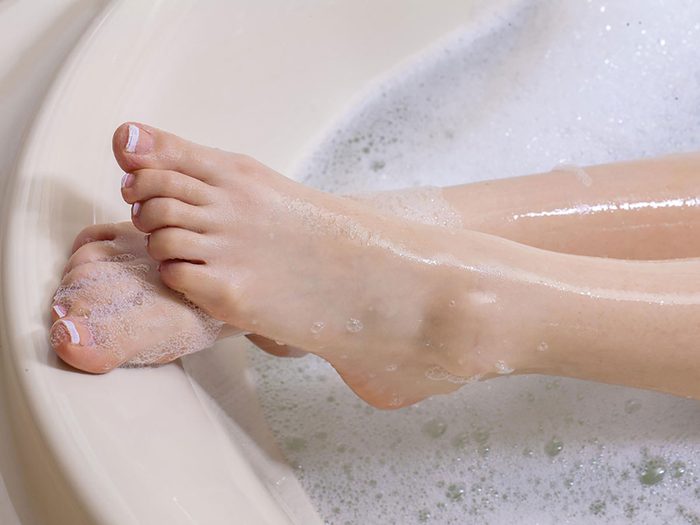
You can help head off athlete’s foot with Epsom salt baths
Soaking your feet in an Epsom salt bath can help prevent and treat the fungus that causes athlete’s foot, says Ray Sahelian, MD, nutrition expert. “The Epsom salt acts as a drying agent,” he explains. Or, try one of these other natural treatments for athlete’s foot.

An Epsom salt bath can help ease psoriasis
Epsom salt is one of the natural remedies recommended by the National Psoriasis Association for dealing with the painful, itchy plaques. Just be sure to moisturize afterward as the salts can be very drying and dry skin can make psoriasis worse, they add.
Next, check out the everyday habits that are drying out your skin.
